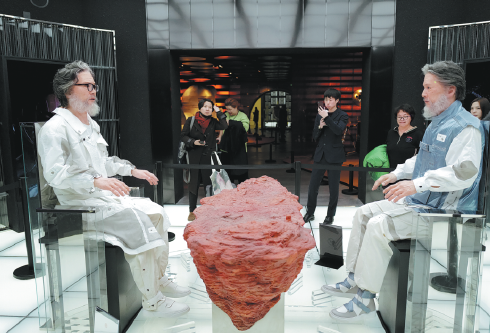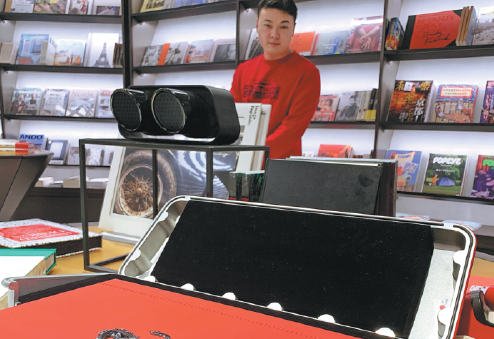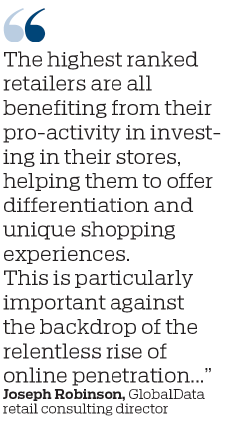Developing the fine art of retail engagement

SKP Beijing focuses on high-end products and services to retain a loyal group of customers
SKP Beijing, a luxury shopping center, is embracing a mix of technology, art and fashion to take on online rivals and attract younger customers.
In a digital age when many tech savvy Chinese consumers only shop online, SKP Beijing, the brick-and-mortar shopping center located outside the city's third ring road, sold goods worth 1.01 billion yuan ($145 million) in a single day in November last year. The record-breaking revenue was generated from more than 70,000 consumers.
In 2018, Beijing SKP's sales revenue climbed to 13.5 billion yuan, second globally only to Harrods in London. In China, Deji Plaza ranked second with revenue of 10 billion yuan.
Harrods in London, SKP in Beijing, Le Bon Marché in Paris, Selfridges and Liberty in London remain the top five most productive stores in the world in terms of estimated sales per feet, according to the Sybarite Report 2019-the Future of Luxury Retail. The report was conducted by Sybarite and GlobalData.
According to Joseph Robinson, GlobalData retail consulting director, "the highest ranked retailers are all benefiting from their pro-activity in investing in their stores, helping them to offer differentiation and unique shopping experiences.
"This is particularly important against the backdrop of the relentless rise of online penetration, and the increasing focus among luxury brands on going alone with standalone stores."
SKP Beijing ranked second globally, with annual retail sales per square foot hitting $1,997 in 2018, according to the report. Founded in 2007, SKP Beijing was previously known as Shin Kong Shopping Center with 50 percent stakes each held by Beijing Hualian Group and Shin Kong Mitsukushi group, with the latter in charge of management. In 2015, Beijing Hualian Group acquired the majority of the shares from Shin Kong and started to manage the store itself.
Ji Xiao'an, chairman of Beijing Hualian Group, said during an industry group research trip to Beijing SKP, that SKP's focus on retail, high-end products and services has cultivated a loyal group of consumers. SKP has accurately targeted its consumer group and designed a package of services based on their needs.
The shopping center has been able to ensure its consumers return through gifting and coupons rather than discounts or promotions.
Beijing SKP sells about 827 luxury brands including Hermes, Chanel, Louis Vuitton, Dior and Gucci, and has collaborated with 200 leading emerging designers.
The shopping mall has collaborated with leading global luxury houses to develop products only sold in SKP. About 38 percent of top global luxury brands have chosen SKP as their launch site.
Experienced buyers and self-owned brands are considered the most valuable assets for SKP Select-its buyer stores that have closely connected with designers, global buyers and local consumers. With more than 200 designer brands at home and abroad, SKP Select has gathered accessories, apparel and lifestyle products from J.W. Anderson, Maison Margiela and Rick Owens. Relying on relatively low prices and niche brands that do not have their own outlets in China, the mall is able to attract customers and boost revenue.
However, its tight concentration of customers remains a challenge as nine out of 10 are local, with the majority residing in Chaoyang district in eastern Beijing where the mall is located. In 2018, the mall was remodeled, adding dining services to create a luxurious leisure environment.
The mall does not sell online due to the belief that technology should not detract from high-end services, Ji said.
Instead, SKP has combined social sharing, experience and retail to enhance its in-store services. With 74 percent of consumers now saying they would be more loyal to a business that allows them to speak to a person rather than those that rely solely on digital channels, the need for knowledgeable and engaging luxury services will become the new normal, according to the Sybarite report.
Only last month, SKP opened a new outlet SKP-S across the street to the south of the original store, creating a social buzz among local shoppers, particularly the younger generation, which was its aim.
With its futuristic exterior and interior housing brands such as Moncler, Balenciaga and Diesel, SKP-S, which opened on Dec 12, is SKP's attempt to develop an alternative form of the traditional shopping mall. The new addition is a collaboration between South Korean eyewear retailer and brand Gentle Monster and SKP.
Aiming to attract Generation Z consumers with imaginative designs, concept stores and trendy brands at the entrance of the first floor, a herd of AI-enabled sheep showcases the future of farms as part of SKP-S' art experiment space.
On the second floor, a presentation of the history of Mars creates a backdrop for fashion apparel and the third floor, themed Mars Rediscovery, features shoes.
Xie Dan, deputy-general manager of SKP, said the new mall is not a copy of SKP but an innovative destination where the younger generation of consumers can embrace a mix of technology, art and fashion.
"It is not simply about age," said Xie. "It is about the mindset to be bold and creative."
Hankook Kim, founder of eyewear brand Gentle Monster, said the collaboration is a bold innovation toward a new consumption culture and the design of the shopping mall aims to challenge traditional retail spaces with unique imagination.
"The store is about telling a story about the future of luxury consumption and how a successful store should be operated."
How to differentiate the luxury shopping experience from those offered by other global luxury retailers is a challenge for the South Korean eyewear design firm.
"We want people to come here and feel encouraged to try something different or new," said Kim.
In Asia, it is becoming more important for retail to maintain a balance between local, discovery and destination tenants, with spaces such as SKP in China reflecting a more lifestyle-driven approach to shopping, according to the Sybarite report. Guo Zengli, president of the China Shopping Center Development Association of Mall, said SKP-S is a natural extension of SKP and will have a more amplifying effect based on its current customer groups.
The introduction of art space as a new approach to enrich the shopping environment has no doubt improved the experiences of shoppers. On the other hand, it has reduced the efficiency of the shopping space in terms of revenue per square meter.
How to deal with the balance between art display and efficiency of the shopping space in terms of generating revenue has been a major challenge for mall operators.
Huang Dan, a 29-year-old marketing specialist, who has visited SKP-S, said: "The visitors attracted by the art exhibition in the shopping mall are here mostly to take photos and share them on social media.They are not necessarily real shoppers looking to purchase luxury brands in the mall."
Lai Yang, deputy director of Beijing Commerce Economy Association, said mall and department store operators have to take into consideration how to balance their innovation and investment efforts, particularly in terms of cost control in achieving the immersion experience created by the mix of arts, brands and fashion.
wangzhuoqiong@chinadaily.com.cn
























